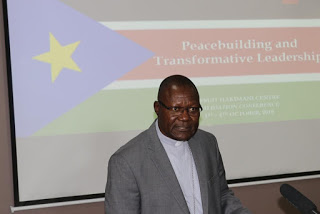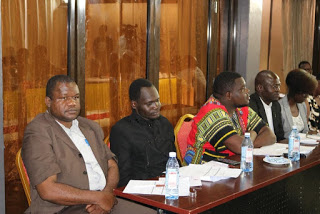KENYA: The South Sudanese Themselves Key To Bringing Peace To Country, Bishop Oballa Says

Rt. Rev. John Oballa Owaa Delivering his Key Note Address at the Research Results Validation Conference Organized by Jesuit Hakimani Centre in Nairobi
The Chairman of Justice and Peace Commission at the Kenya Conference of Catholic (KCCB) Rt. Rev. John Oballa Owaa, who is also the bishop of Ngong Diocese in Kenya has challenged the South Sudanese to take initiatives towards bringing lasting peace to their country. He said that help from outside, especially the international community and continental bodies, is most welcome but a concerted effort and commitment must come from the Sudanese themselves.
In his key note address during the Jesuit Hakimani Centre Research Validation Workshop held in Nairobi between 2-4 October, 2019 under the theme Transformative Leadership in South Sudan Bishop Oballa said that the South Sudanese themselves are key because peace must be built together by nurturing seeds of love and unity and by working for it.
He noted that although African countries and established bodies such as the Inter-Governmental Authority for Development (IGAD) and African Union have to play their roles in enforcing peace agreements, the transformational aspects of the agreements must be done by the people of South Sudan themselves.
Such aspects include constitutional changes; free, fair and acceptable elections to avoid chaosand unnecessary wars; proper justice systems; protection of human rights and dignity; active civil participation; financial accountability; and security sector reforms.
“Indeed there is need for constant and consistent promotion of dialogue and collaboration among the mainstream political leaders, and that goes beyond doing a handshake just for the sake of the cameras,” Bishop Oballa pointed out.
He expressed delighted to the fact that religious leaders in South Sudan are able to have a one-on-one meeting with political leaders; to pray for and with them and with their families as indicated by Archbishop Paul Pitya Yugusuk of Episcopal Church in South Sudan. He therefore recommended political leaders into having permanent chaplains.
“I know of a Head of State who actually made the request and said I need a chaplain, I need somebody every single day to turn my heart and my thoughts to God the Father and his wish was granted. I think this is an aspect that we could also explore because their sanity, peace of mind and their reverence for God contributes to how they relate with the people that God himself has entrusted into their hands,” Bishop Oballa said.

Bishop Oballa further noted that the challenges highlighted in the Jesuit Hakimani Centre’s Research findings on Transformative Leadership in South Sudan need to be addressed by various authorities and individuals – challenges such as governance, proliferation of small arms and light weapons, lack of political will to implement peace agreements, internal power struggles for control and dominance, lack of trust, negativity and poor distribution of resources among others.
Quoting the Pope Francis, Bishop Oballa said that conflicts cannot be concealed; rather they have to be faced and dealt with head-on.
“It is high time, my brothers and sisters in South Sudan, to seize the opportunities and avenues at your disposal for growth and reform; to revamp democratic governance and electoral reforms; to promote economic growth by moving beyond aid; and make contributions toward creating an enabling environment for economic growth and investment.”
Meanwhile Bishop Oballa has applauded the efforts of religious leaders and faith based organizations for their quest towards bringing a lasting peace in South Sudan. According to the research conducted by the Jesuit Hakimani Centre, almost half of the respondents have confidence in the capacity of religious leaders to influence national leadership in South Sudan.
“This is attributed to their spearheading national dialogue as well as sacrificing their time and resources, risking their lives to advocate for justice and peace among the leaders and citizens. The voice of Bishop Paride Taban, a Sudanese Shepherd continues to resound from his Kuron Peace village way beyond South Sudan. And indeed despite the challenges being met by interfaith groups, ecumenical groups in peace-building and reconciliation, these efforts deserve a mention,” said Bishop Oballa.
∽End∽
By Pamela Adinda, AMECEA Online News


